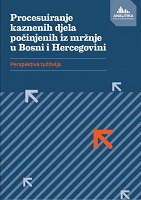Prosecution of Hate Crimes in Bosnia and Herzegovina - The Prosecutors’ Perspective
Prosecution of Hate Crimes in Bosnia and Herzegovina - The Prosecutors’ Perspective
Author(s): Marija Lučić-Ćatić, Amir Bajrić
Contributor(s): Amra Mehmedić (Editor), Edin Hodžić (Editor), Mirjana Evtov (Translator), Sanela Hrlović (Editor)
Subject(s): Criminal Law, Security and defense, Penal Policy, Court case
Published by: Analitika – Centar za društvena istraživanja
Keywords: BiH; hate crimes; criminal law; court; prosecution; prosecutor perspective; police role; penal policy;
Summary/Abstract: Hate crimes, understood as offenses motivated by hatred or prejudice against a particular group, are extremely damaging because of their harmful effect on the very foundation of society and trust between communities. In Bosnia and Herzegovina (BiH) these offenses are particularly dangerous because of their substantial potential to increase the existing tensions and negatively affect the trust building process and genuine recovery of the whole society. On the other hand, the legacy of the local war in the nineties of the last century, the existing fragmentation of the society, the dominance of collective identities and the media propagation of intolerance (and hatred) on a daily basis all contribute to the perception that in BiH society incidents motivated by hatred are not only ubiquitous, but generally accepted as “normal”. Bearing in mind how important and serious the repercussions of hate crimes may be, it is imperative to introduce comprehensive preventive measures and activities and improve criminal legislation in this area. However, the successful prosecution of hate crimes in BiH requires much more than adopting an appropriate legal framework. The efficient implementation of the legal framework and the improvement of hate crime prosecution are subject to solving a number of concrete problems. In this regard, while taking into account the existing legal framework in this field in all of the four BiH jurisdictions, this study seeks to identify the key problems that prosecutors may face in bringing charges of hatred or deciding whether to classify a crime as a hate crime, and to establish how to overcome these problems. In other words, the fundamental objective of the study is to determine the underlying issues in this area and offer recommendations that would serve as a basis for creating the necessary conditions for the successful and adequate prosecution of hate crimes in BiH. The methodological and conceptual approach used in this study differs from that of most previous analyses and studies dealing with the issue of hate crimes, especially in BiH, which have primarily focused on analysis of the legislation, its compliance with international standards, and the reasons it was introduced. This study, with its particular approach, is primarily intended for the legislative and executive bodies, the prosecution services and the police, the BiH High Judicial and Prosecutorial Council (HJPC), training centers for judges and prosecutors, as well as for all experts and practitioners who deal with the issue of prosecuting hate crimes in BiH. In accordance with the specified orientation, the study first presents the conceptual and legal framework, as well as the analytical and methodological approach to the research. After this an analysis of the implementation of hate crimes legislation in each of the BiH jurisdictions is presented. In the next section of the study specific problems which prosecutors face in their practice are analyzed, and the specific structural problems that are important to the (non) prosecution of hate crimes in BiH are clarified. All of the above provide a sound basis for the final part of the study, where, together with the concluding remarks, recommendations are given for improving the prosecution of hate crimes in the BiH context.
Series: Analitika - Report
- Page Count: 74
- Publication Year: 2014
- Language: English
- Introduction
- Content File-PDF

